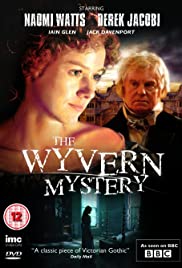
THE WYVERN MYSTERY
UK, 2000, 120 minutes, Colour.
Naomi Watts, Derek Jacobi, Iain Glen, Jack Davenport, Aisling O' Sullivan.
Directed by Alex Pillai.
The Wyvern Mystery is based on the novel by Irish poet, novelist, newspaper editor, Sheridan le Fanu, who is, perhaps, most famous for his lesbian vampire story, filmed many times and with many variations, Carmilla. He also wrote the Gothic story, Uncle Silas.
This film is very much a story of the mid-19th century, the Victorian era, with the traditions of Gothic storytelling.
With a mad woman in the attic, there are echoes of Jane Eyre (and comment that Charlotte Brontë was influenced by him), of rural scenes reminiscent of Hardy and a number of coincidences in Dickens’ vein.
There are dastardly deeds by the squire of the Manor, played with some force by Derek Jacobi. There are orphans, especially the young Alice who has lived in the custody of the squire and who wants to marry her. This was an early role from Naomi Watts after her career in Australia and making some films in the United States. Her breakthrough role in Mulholland Drive came immediately after this film. The two sons of the squire are played by Iain Glen and Jack Davenport. Aisling O’ Sullivan is the mad woman. The film was directed by Alex Pillai who had an extensive career in television series.
This production is in the vein of British historical dramas with a strong emphasis on costumes and decor, locations – with touches of mental deterioration, deaths, mysteries, betrayals.
The novel and this film are not as widely known as other stories and films from these eras.
1. The writings of Sheridan le Fanu? His Irish origins? Stories about England? The Gothic tradition? The British film tradition of historical dramas?
2. The period, the mansions, the countryside, costumes and decor? Sense of period? Musical score?
3. The title, expectations?
4. The opening, Alice’s father, separated from his family, the role of the squire, the death? The squire taking Alice into his care?
5. Alice, the child, growing up, the attentions of the squire, his proposal? Alice and her relationship to his two sons? Her love for Charles, his coming to visit, his father spurning him? Harry, devoted, at home? The planned elopement, Harry and his help, Charles and Alice leaving?
6. The journey, Alice and her expectations, the mystery about Wyvern?
7. The mysterious mansion, the rooms, vast? Secret rooms? Locked?
8. The gradual revelation of the woman, her madness, her screams, her breaking through the wall, the physical attack on Alice? Her meals, Mrs Tarnley taking care of her? The revelation
that she was Charles’s wife?
9. The buildup to the melodramatic climax? The woman, the knife, her stabbing Charles, his death? The infectious disease, taking the baby into care, Alice and her having met Claire, the story of her child and Harry’s support?
10. The collapse of Alice’s world, the death of Charles, the death of her son, the passing of five years, her work in the fields, a strong woman? Going to the grave of her child each year? Going to the house, the encounter with the squire, his physical and mental collapse?
11. Wyvern, Harry as the heir, his taking over?
12. Alice, the discussions with the doctor? Mrs Tarnley and her compassion, deciding to help? Alice’s chance encounter with Claire, Claire and her denials about having a child?
13. Alice getting the information, the background of the old soldier and his story, Charles and Harry with him?
14. Alice going to the house, sinister, the readings from the Bible, the housekeeper, the children and the Bible readings, Alice recognising her son? The drama of her taking her son to safety? Her dreams and fears about him?
15. Alice and her visiting the mad woman, getting the keys, the information, freeing her, her death?
16. Confrontation with Harry, Harry as scheming all the time, his wanting to inherit, the death of his brother, the mad wife, Alice’s son disappearing, the final revelation of him as a villain?
17. The popularity of Gothic melodrama, sinister characters, betrayals, disasters – but a final happy ending?